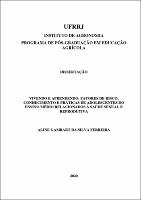Please use this identifier to cite or link to this item:
https://rima.ufrrj.br/jspui/handle/20.500.14407/12748| Tipo do documento: | Dissertação |
| Title: | Vivendo e aprendendo: fatores de risco, conhecimento e práticas de adolescentes do ensino médio relacionados à saúde sexual e reprodutiva |
| Other Titles: | Living and learning: risk factors, knowledge and practices of high school adolescents related to sexual and reproductive health |
| Authors: | Ferreira, Aline Gambart da Silva |
| Orientador(a): | Gonçalves, Sílvia Maria Melo |
| Primeiro membro da banca: | Gonçalves, Sílvia Maria Melo |
| Segundo membro da banca: | Damasceno, Allan Rocha |
| Terceiro membro da banca: | Bernardino, Adriana Vasconcelos da Silva |
| Keywords: | Adolescência;Sexualidade;Métodos contraceptivos;Gravidez na adolescência;Adolescence;Sexuality;Contraceptive Methods;Teenage Pregnancy |
| Área(s) do CNPq: | Educação |
| Idioma: | por |
| Issue Date: | 4-Aug-2020 |
| Publisher: | Universidade Federal Rural do Rio de Janeiro |
| Sigla da instituição: | UFRRJ |
| Departamento: | Instituto de Agronomia |
| Programa: | Programa de Pós-Graduação em Educação Agrícola |
| Citation: | FERREIRA, Aline Gambart da Silva. Vivendo e aprendendo: fatores de risco, conhecimento e práticas de adolescentes do ensino médio relacionados à saúde sexual e reprodutiva. 2020. 66 f. Dissertação (Mestrado em Educação Agrícola) - Instituto de Agronomia, Universidade Federal Rural do Rio de Janeiro, Seropédica, 2020. |
| Abstract: | Na adolescência, a vivência da sexualidade torna-se mais evidente. Com o objetivo geral de promover ações para conscientização da prevenção das Infecções Sexualmente Transmissíveis – IST e gravidez precoce, foi realizado um estudo qualitativo no estilo pesquisa-ação no Instituto Federal do Espírito Santo – Campus de Alegre, com adolescentes na faixa etária de 16 a 19 anos, alunos do 2º ano do curso técnico em agropecuária integrado ao ensino médio. Os dados foram coletados por meio de questionário pré e pós-intervenção com perguntas fechadas e abertas, e ainda pela observação participante com registros em diário de campo, por meio de gravação de vídeo, áudio e fotografias. Para investigação na categorização das respostas abertas foi utilizada a Análise de Conteúdo de Bardin. Na aplicação do estudo foram estabelecidas e efetivadas ações como palestras, oficinas temáticas, dinâmicas, apresentação de filme e debates sobre o tema saúde sexual e reprodutiva. Os resultados identificaram a carência de informações por parte dos alunos envolvidos sobre a temática, verificando no questionário pré-intervenção que 48% dos entrevistados disseram não ter informações suficientes sobre o assunto; 59% dos alunos relataram, tanto no questionário pré quanto pósintervenção, dificuldade em dialogar com seus pais/responsáveis e, 90% dos entrevistados responderam no questionário pré e pós-intervenção que a instituição de ensino não oferece e/ou oferece poucas informações sobre sexualidade. Observou-se que os adolescentes se interessam em aprender mais sobre o seu corpo, principalmente no que diz respeito aos órgãos envolvendo sua sexualidade. Pode-se vislumbrar que o método em forma de oficina favorece espaço de discussão, de troca de experiências pessoais e de grupo, partindo da realidade para a reflexão e o debate de suas próprias práticas. Com isso, buscou-se formar indivíduos com conhecimento e percepção das realidades que os envolvem, reafirmando a necessidade de articulação entre família e instituição de ensino, esta última atuando cada vez mais na educação sexual dos adolescentes |
| Abstract: | In adolescence, the experience of sexuality becomes more evident. With the general objective of promoting actions to raise awareness about the prevention of Sexually Transmitted Infections - STI and early pregnancy, a qualitative study in the style of action research was carried out at the Federal Institute of Espírito Santo - Campus de Alegre, with adolescents aged 16 to 19 years old, 2nd year students of the technical course in agriculture integrated to high school. Data were collected through a pre- and post-intervention questionnaire with closed and open questions, and also through participant observation with records in a field diary, through video, audio and photo recording. Bardin's Content Analysis was used to investigate the categorization of open responses. In the application of the study, actions such as lectures, thematic workshops, dynamics, film presentation and debates on the sexual and reproductive health theme were established and carried out. The results identified the lack of information on the part of the students involved on the theme, verifying in the preintervention questionnaire that 48% of the interviewees said they did not have enough information on the subject; 59% of students reported, both in the pre-and post-intervention questionnaire, difficulty in dialoguing with their parents/guardians, and 90% of respondents answered in the pre and post-intervention questionnaire that the educational institution does not offer and/or offers little information about sexuality. It was observed that adolescents are interested in learning more about their bodies, especially with regard to the organs involving their sexuality. It can be seen that the method in the form of a workshop favors a space for discussion, for the exchange of personal and group experiences, starting from reality to reflect and debate your own practices. With this, we sought to train individuals with knowledge and perception of the realities that surround them, reaffirming the need for articulation between family and educational institution, which is increasingly acting in the sexual education of adolescents. |
| URI: | https://rima.ufrrj.br/jspui/handle/20.500.14407/12748 |
| Appears in Collections: | Mestrado em Educação Agrícola |
Se for cadastrado no RIMA, poderá receber informações por email.
Se ainda não tem uma conta, cadastre-se aqui!
Files in This Item:
| File | Description | Size | Format | |
|---|---|---|---|---|
| 2020 - Aline Gambart da Silva Ferreira.pdf | 2020 - Aline Gambart da Silva Ferreira | 1.67 MB | Adobe PDF |  View/Open |
Items in DSpace are protected by copyright, with all rights reserved, unless otherwise indicated.

